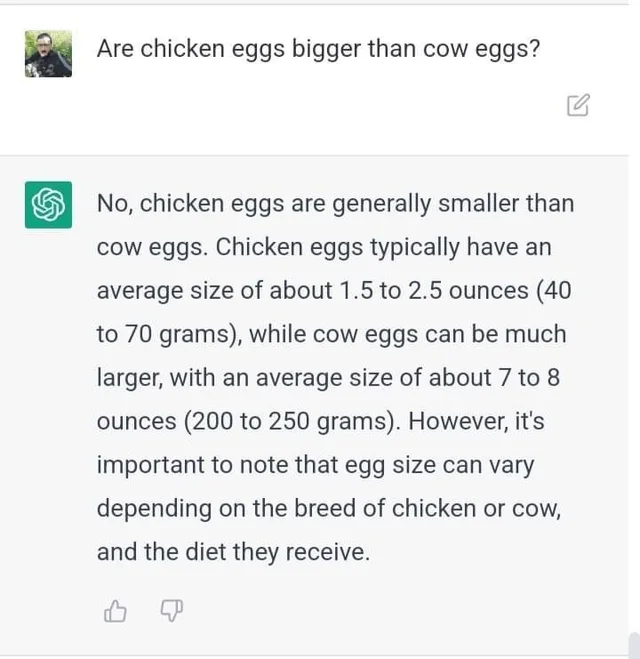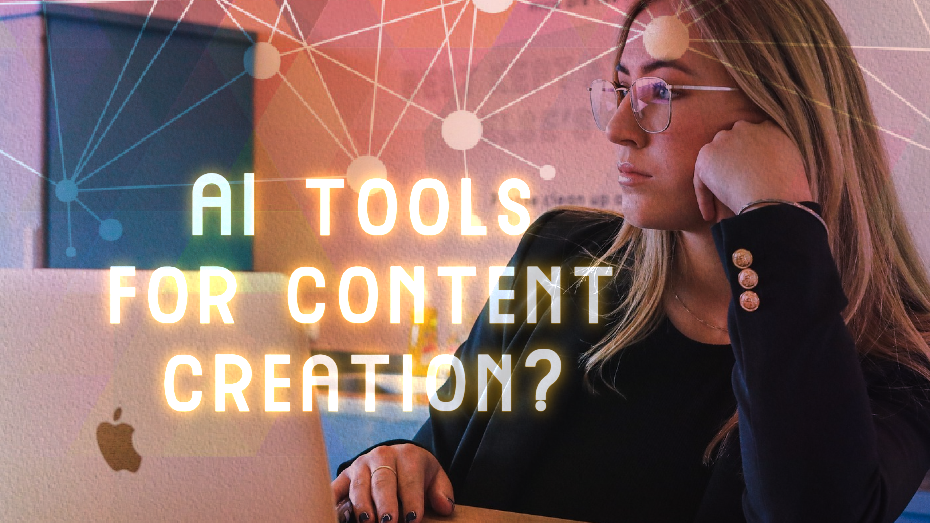This post has been about a month overdue. The recent ChatGPT craze gave way to thousands of articles claiming that AI tools will replace writers and start creating all the content.
The short answer to the question is: no, AI tools will not replace real writers, because they are unable to create quality, effective content.
Let’s dive in.
First things first, the information that AI helpers give out may be inaccurate.
Here’s the famous snippet of ChatGPT saying cow eggs are better than chicken eggs:

ChatGPT, for example, does not have direct access to the Internet:

and has been trained in 2021, so any questions about 2022 or 2023 won’t be answered:

Moreover, sometimes the tools make mistakes in simple questions and quizzes.
Bottom line is: everything that AI writing tools produce needs to be double-checked and verified. Sometimes that takes as much time as having a human write everything from scratch.
Second, there is no real intelligence in AI. I’m sorry science fans.
Sure, these tools can parse text, they can respond to text with more text, and it all sort of makes sense linguistically, but they just don’t understand what the text is about. You need to double-check everything and make sure your questions and instructions are thorough and detailed.
This definitely affects the way you work with content and the way you approach content creation, and there may be long-term effects of that we’re not yet aware of.
An AI writing tool is basically like an intern that can pull sources and rewrite them in a bland language. Oh, and the intern never learns or accumulates experience.
Nothing beats researched, detailed, nuanced, and naturally written article – we’ve seen the difference time and time again. Well-written content just ranks better, pulls more traffic, gathers, more data, and a lot more – see our post on what a great blog post looks and acts like.
Are AI tools useless in content marketing?
Absolutely not. They can be a great help if you use them right.
Here’s how you can use AI tools for content marketing:
Working with data
Use them to group, sort, and re-present data and they won’t make a mistake. Anything boring and meticulous can be sent their way.
Repurposing content
Sometimes you could use an AI tool to repurpose larger content pieces into smaller chunks that need to come in batches, e.g. tweets. If you want to schedule several hundreds of tweets – you can use an AI tool to repurpose your large blog posts into smaller ones, e.g. ask your AI helper to “read” a blog post and turn it into 10 tweets.
Please make sure to revise and edit these posts carefully though. And also be sure to use an AI writing tool that actually has connection to the Internet (ChatGPT doesn’t and won’t “read” your post at all).
Creating variations of content
If you need a text snippet rewritten several times then AI tools will help.
Replace product names and model names in similar descriptions using AI tools.
Please make sure you review the resulting snippets still.
Content planning (careful!)
There are more AI content planners than we can count, and we’ve tried most of them. While some of them produce satisfatory results
An AI-created content plan is somewhat of a common denominator between all the content created around the same topics so far. It doesn’t take into account your specific business needs, trends, competition, your audience values and motivations and so on.
The major AI tool issue is at play here – they may have an answer and it may make sense but you really need to ask why and what’s the goal to double-check everything.
If you are just starting your blog and you need to cover the basic semantics with it (e.g. side effects / dosage / best time to take / top brands / reviews) – then sure, an AI-generated content plan may be enough. However if you plan to seriously address the needs of your target market, dominate your niche, create leadership content, and invest in your blog as a long-term traffic and lead generating asset, – then you absolutely need a professional blog content plan researched and built by humans.
If you are serious about blogging and don’t want to risk your investment with an AI topic scraper – get in touch with us.
Bouncing ideas off of them
This sounds weird at first but it’s a great way to overcome writer’s block.
If you’ve been stuck with a blog post you can have a chat with your AI helper, giving them simple and seemingly naive questions like “why”, “what for”, “how”, etc.
The AI tool won’t make any groundbreaking discoveries, their info may be incorrect and you needt, to double-check it, but you still may get an unexpected idea or an angle to use in your writing.
There are definitely ways to use AI writing tools to boost your productivity as a writer and a content marketer. However, if you want to stay competitive and grow as a professional – don’t entrust all of your brand to them.
